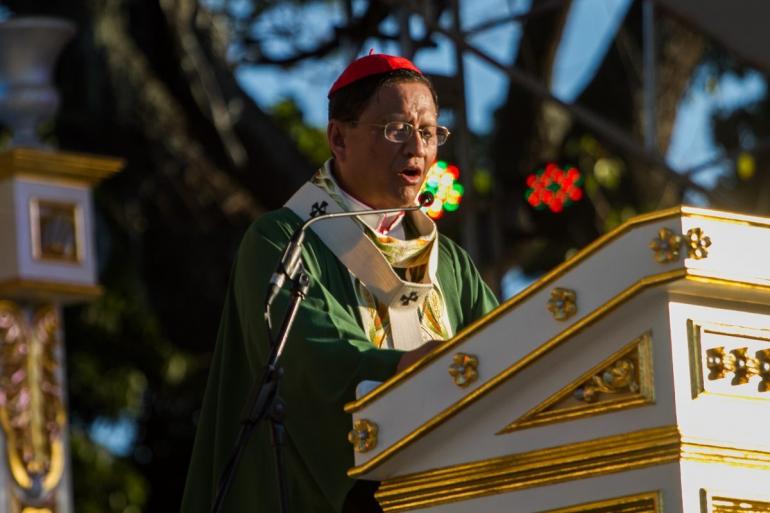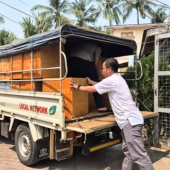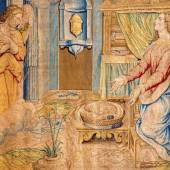As COVID-19 dances across lives, let compassion become our common religion

Cardinal Charles Maung Bo of Yangon
Dear Brothers and Sisters,
Blessings in the powerful Name of Jesus. Let his mighty hand stay with every one of you, console you, comfort you and heal you. More than ever, we need one another, trust one another, lean on one another, we need the Lord. The World needs the healing hand of the eternal healer.
History has shown we shall overcome, normalcy will return. We are meeting again online. Our hearts are united, we are united in faith. We are united in the Mystical body of Christ.
Once again we meet amidst another lockdown, stay home. These are dark times, when evil seems to be on a winning spree. For six long months, the Lord protected our simple nation from the ravages of the merciless contagion. But the last one month the new coronavirus seems to be dancing its sadistic dance in the streets of major cities. We pray for all the areas where this virus has penetrated.
We pray for every person who is in pain, who is affected, who is overcome with panic. To the thousands who are sick, our heart goes to them, our hands are raised with bent knees imploring quick recovery. For millions who lost their livelihood, we pray to the Lord who gave manna in the desert and multiplied five loaves and fed five thousand people “Lord Feed our people. Heal our People. Wash them clean with your Blood.” Myanmar Church is already planning its response. We shall stand by our brothers and sisters through prayer and by our generosity.
These are times of prayer. These are times of compassion. During the Nargis cyclone, we wrote, when Myanmar was attacked by natural disasters, compassion became the common religion. We all become brothers and sisters. We were strengthened by unity. A massive disaster went away.
Today when the virus has declared a war against humanity, let us move to compassion as our common religion. We shall overcome as one people, one nation. It is time to stop all conflicts. Let the brotherhood of humanity assert itself.
God who took pity on the suffering Israelites and called Moses to redeem them, today he looks at our country and says “I hear the cry of the suffering people.” Bible records ten pandemics. In each God showed himself to be “full of compassion, moved by mercy to his people. We pray the Lord of Creation shows the same compassion to all of us. Jesus who took pity on the starving people today calls to every one of us “Be compassionate as your heavenly father is compassionate.”
This Sunday, the Pope calls us to remember the Migrants and refugees. More than 40 million people were thrown out of their homes because of the permanent pandemic of hatred and poverty. Let us pray with the Pope. “Like Jesus, thousands are displaced, let us welcome, protect and promote and integrate thousands who live inside our borders as IDPs.” To all the people living in the IDP camps in our country, we join our Holy Father and pray for peace and dignified return home. Jesus was an IDP, a refugee and a migrant. He lived like thousands of our Myanmar Youth. He understands our tears. Let us welcome every stranger as we would welcome Jesus.
Today’s readings affirm a God who is loving, forgiving, seeking those who are least and the lost. Many fundamentalist preachers have proclaimed this COVID as the punishment from God. Today’s first reading says God preserves the life of the right and just. God is like the father in the parable of the Prodigal Son, waiting for our return. God is love. God is not revenge. COVID is not the time of God’s revenge, it is not punishment. It is a time of love. It is a time of bringing God to one another in virus attack.
The second reading gives us a clue to this scourge of virus. Humility and unity in the face of common enemy. As the virus broke off in the world scene, the countries headed by autocrats and head strong leaders full of inflated ego, let their people to die in thousands. Some of the most affected countries are headed by men, whose lack of empathy and compassion made millions to be infected and thousands to die. As St. Paul writes in the Second reading to Philippians, these leaders did everything “out of selfishness and vainglory, looking out for their own glory.”
Those who saved their people are humble leaders, mostly women leaders. Because in the words of St. Paul, “They humbly regard others as more important than themselves.” The self-emptying humility of these leaders saved lives. COVID started where there was an arrogant leadership and flourished in countries where arrogant leaders had their selfish agenda. Simple and humble leaders like New Zealand Prime Minister Miss Jacinda Ardern give a leadership that defeats even the pandemic. The self emptying of thousands of front line workers saved millions.
They embodied the “self emptying,” the kenosis of Christ praised by St. Paul with those immortal words: “Though he was in the form of God, did not regard equality with God, something to be grasped. Rather he emptied himself, taking the form of the slave.”
This is a great lesson during the COVID time. The egoism of world leaders is killing thousands. Egoism in our relationship will kill us and others. By protecting ourselves we protect others.
The same lesson comes to the Pharisees and the Sadducees in the Gospel today. Assuming that they are the rightful heirs to God’s Kingdom, they forgot mercy and compassion. With inflated ego, they could load the innocent with laws and rules. Their lack of humility is castigated by Jesus with the searing words: the prostitutes and the tax collectors will enter the Kingdom of God before any one of you. Jesus was candid all throughout: the first will be last, the last will be the first. Mary will affirm this in the Magnificat:
He has shown might with His arm,
He has scattered the proud in the conceit of their heart.
He has put down the mighty from their thrones,
and has exalted the lowly.
The virus threat taught us how life is so fragile. A month ago, our nation saw only eight deaths now the death rate is about 100. Hundreds of our innocent people who went about their work a month ago are now sick. The fragility and the passing nature of our life teaches us only one commandment: Life is so precious, let us not waste in hatred of one another, let us love one another as Jesus loved us.
This love commandment is the antidote we are seeking amidst these dark times of panic of pandemic. That is the vaccine we are looking for the suffocating darkness of infection. We need to be healed by love. The message of God is Love. The word love appears more than 500 times in the Bible, more times than “death” or “hell”, implying we are called upon to live in love. It is not important how many years we lived, but it is very important to know how many people we really loved in this short life.
The Pharisees in today’s Gospel had enormous spiritual powers. They used that power to subjugate people. COVID also throws great questions about power. Power is not to dominate, power is to service. The real power, Pope Francis says, is in the service. The COVID pandemic is teaching us to give up the power of arrogance but to go to the power of love, the power of empty hands with hearts full of empathy. Nobody knows the purpose of this pandemic — except that it has shaken humanity. Every pandemic does leave painful lessons.
Some lessons the Pharisees and lawyers failed to learn are the lessons of Jesus. But the humble and the simple people of Israel, the prostitutes and the tax collectors learnt. This contagion is teaching us: Be humble, we all belong to the same God.
We draw more lessons from the parable Jesus says: About two sons. The first son refuses his father’s call to go and work in the field. Then he voluntarily goes by himself and works in the vineyard. The second son, when asked the same request by the Father, he readily agrees but later does not go. The first one obeyed in deed and the second one obeyed only in words.
The Gospel parable is directed at the hypocrisy of the religious and civil leaders of the Jewish society of Jesus’ day. The Pharisees were guardians of law but not the love of God. They wanted God be served by the strict observance of the law. But it is clear they did not have the spirit that Jesus was preaching through his life and teaching, namely Love, Love and Love. Show compassion, caring and forgiveness for the weak and vulnerable. The Pharisees are like the second son: they hear the word but made no effort to carry it out. Since Jesus was preaching a forgiving love, they rejected him.
COVID exposed such religious and civil leaders. Even today some leaders who talked about national security failed to give human security when the virus attacked them. Fundamentalist preachers who preached about God’s punishment with fire and brimstones are not found in the quarantine centers or hospitals. The prosperity gospel crowd is the second Son, listening and even preaching the Word but forget to show it in action.
On the other hand, Jesus tells them that the tax collectors and the prostitutes are making their way into the kingdom of God before they do. These certainly were not keeping God’s Law. They even had said no to his commandments many times. But then they encountered Jesus and they experienced a radical transformation in their lives. They listened to him and they responded.
The sinners, the outcasts of both Jewish and Gentile society, are like the first son. They do not obey God’s commands, they commit many sins, but later they accept the teaching of Jesus and become his followers. The first will be last in the Kingdom — the Pharisees are; the last will be the first — the humble people of Israel.
Christians encounter the same risk. Our outward observance of faith may not be enough. Jesus warns us as he warned the Pharisees: "Not everyone who says to me, 'Lord, Lord,' will enter the kingdom of heaven, but only the one who does the will of my Father who is in heaven. (Mt 7:21). St James calls for “Faith with action’.
COVID challenged the liturgical observance. But it has opened the door for faith in action. We have seen the cases exploding at a fearsome rate. Panic and fear grips every person. How can a Christian reach out? Like the first son or the second son of the Gospel of today?
Despite our great challenges during this time, how we can still reach out to our pandemic affected brothers and sisters — that is the real test to our faith the COVID has thrown to us. Hundreds of volunteers, health workers are at the frontlines, exposing themselves to great risk to save others.
These may find God’s blessings rather than people who spent hours together in depression about why God had brought pandemic on human family. This is the time not to ask “why” like the Pharisees did, but to move towards “what and how” we can do to reach out to those in lockdown areas with whatever help we can render. Let us become the first sons despite our mind constantly telling us to be cautious and say no, let our heart reach out to our people.
Those of us who cannot offer anything, let us offer our prayers. In times of crisis you do not benefit less, but more from prayer. Grant it to yourself to indulge in His love. It is the best antidote to fear. St. Augustine wrote: “Love ought to manifest itself more by deeds than by words.”
Let us become worthy of the Kingdom by looking after one another in whatever way we safely can, especially remembering the poor and the vulnerable. We will overcome. Everything will pass away. Because the living, loving and liberating God is in charge. He is not the Lord of Death, He is the Lord of Life. Emmanuel, Live in us
This is a homily delivered by Cardinal Charles Maung Bo of Yangon on the occasion of the observance of World Day of Migrants and Refugees
Radio Veritas Asia (RVA), a media platform of the Catholic Church, aims to share Christ. RVA started in 1969 as a continental Catholic radio station to serve Asian countries in their respective local language, thus earning the tag “the Voice of Asian Christianity.” Responding to the emerging context, RVA embraced media platforms to connect with the global Asian audience via its 21 language websites and various social media platforms.














